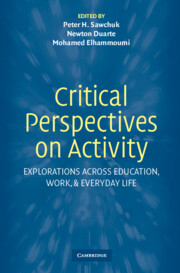Book contents
- Frontmatter
- Contents
- List of Contributors
- Foreword by Seth Chaiklin
- Acknowledgements
- 1 Introduction: Exploring Activity Across Education, Work, and Everyday Life
- SECTION I CRITICAL PERSPECTIVES ON THEORY
- SECTION II EDUCATION
- 5 The Importance of Play in Pre-School Education: Naturalisation Versus a Marxist Analysis
- 6 Estranged Labor Learning
- 7 “Our Working Conditions Are Our Students' Learning Conditions”: A CHAT Analysis of College Teachers
- SECTION III WORK
- SECTION IV EVERYDAY LIFE
- References
- Index
6 - Estranged Labor Learning
Published online by Cambridge University Press: 10 December 2009
- Frontmatter
- Contents
- List of Contributors
- Foreword by Seth Chaiklin
- Acknowledgements
- 1 Introduction: Exploring Activity Across Education, Work, and Everyday Life
- SECTION I CRITICAL PERSPECTIVES ON THEORY
- SECTION II EDUCATION
- 5 The Importance of Play in Pre-School Education: Naturalisation Versus a Marxist Analysis
- 6 Estranged Labor Learning
- 7 “Our Working Conditions Are Our Students' Learning Conditions”: A CHAT Analysis of College Teachers
- SECTION III WORK
- SECTION IV EVERYDAY LIFE
- References
- Index
Summary
INTRODUCTION
This chapter is in praise of the labor of reading profound and rich texts, in this case, the essay on “Estranged Labor” by Karl Marx. Comparing in detail what Marx wrote on estranged labor with current social practices of learning and education leads us to comprehensive and provocative ideas about learning – including the social practices of alienated learning. We then emphasize the importance of distribution in the institutionalized production of alienated learning. And we end this chapter with critical reflections on the importance of alienation for the relation between teaching and learning in the social practice of scholars.
In 1844, Karl Marx wrote “Estranged Labor,” an essay with a radical philosophical and political claim: labor, prices, profit, and ownership do not exist as things independent of historical circumstance. Rather, they exist only in relations between persons and their productive work. To make matters worse, claimed Marx, the same is true of the words and categories we have available to understand, confront, and reorganize these building blocks or any other relations that define and control our lives: the very content of our minds “takes for granted what it is supposed to explain” (Marx, 1844: 106). Together, the two claims have it that the world is both complex and hidden, terribly so and politically so, even to us, its builders.
- Type
- Chapter
- Information
- Critical Perspectives on ActivityExplorations Across Education, Work, and Everyday Life, pp. 89 - 122Publisher: Cambridge University PressPrint publication year: 2006
- 2
- Cited by

